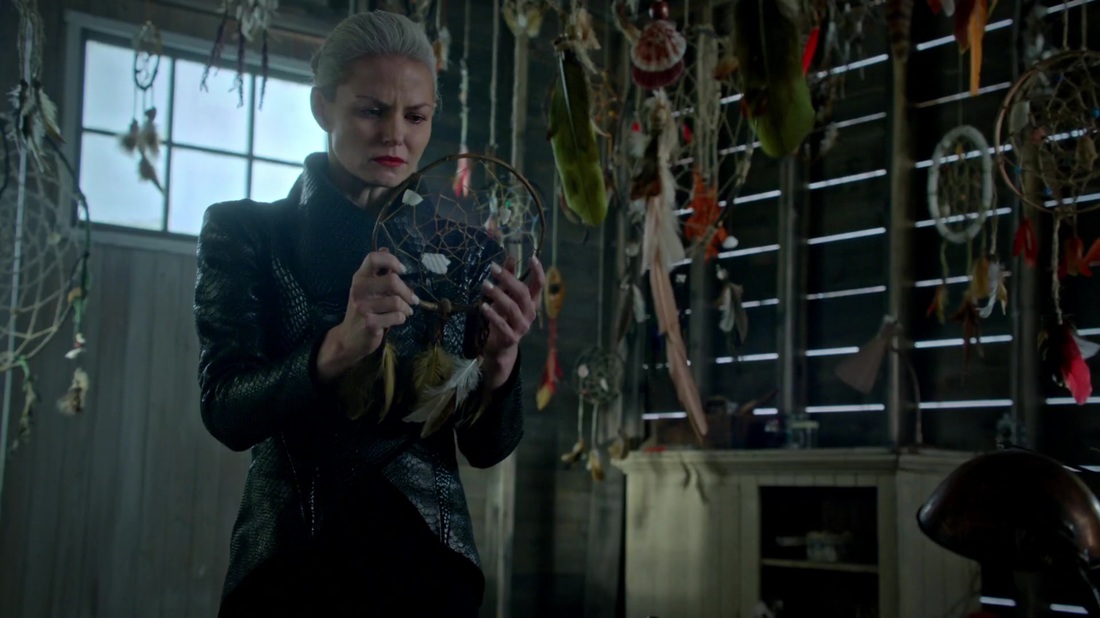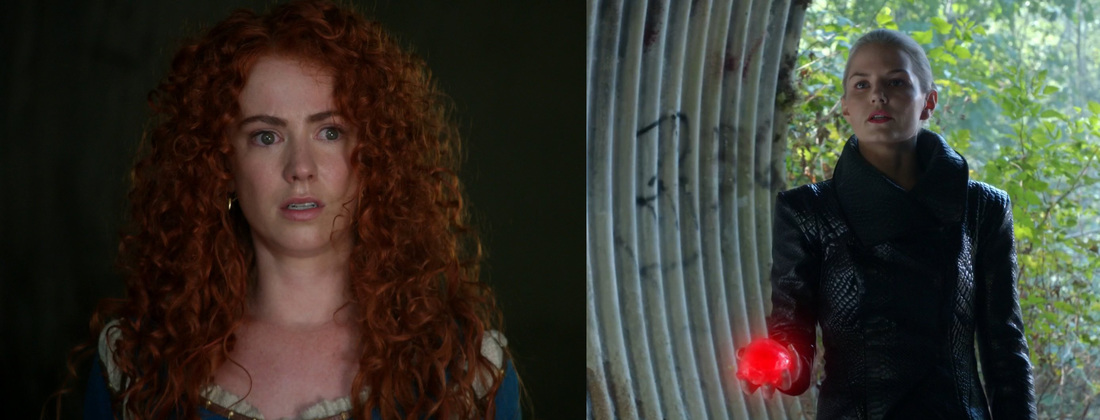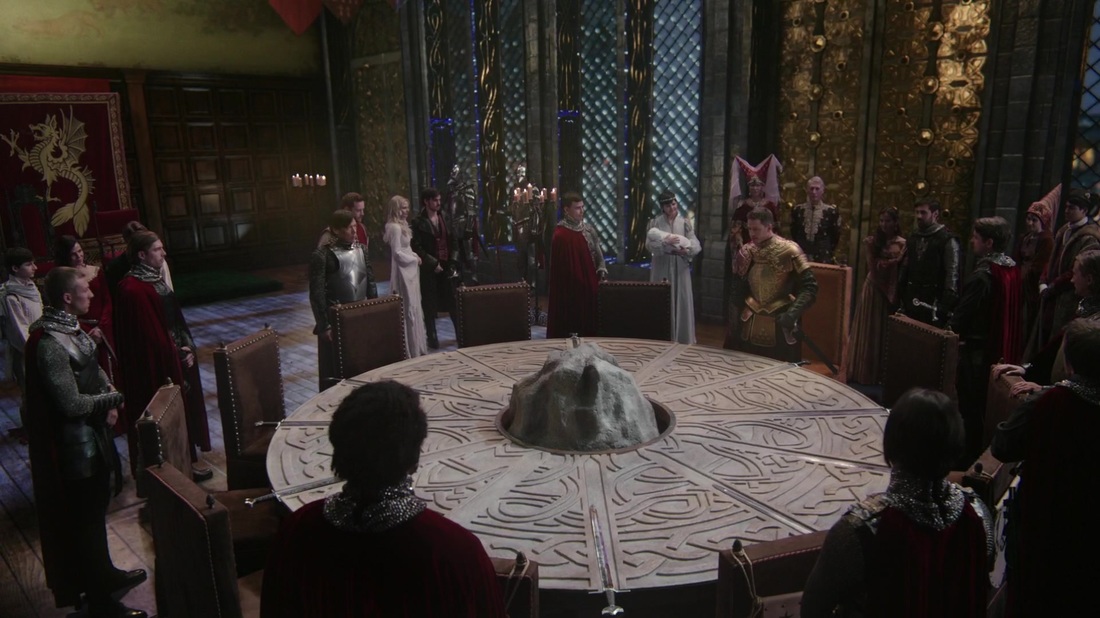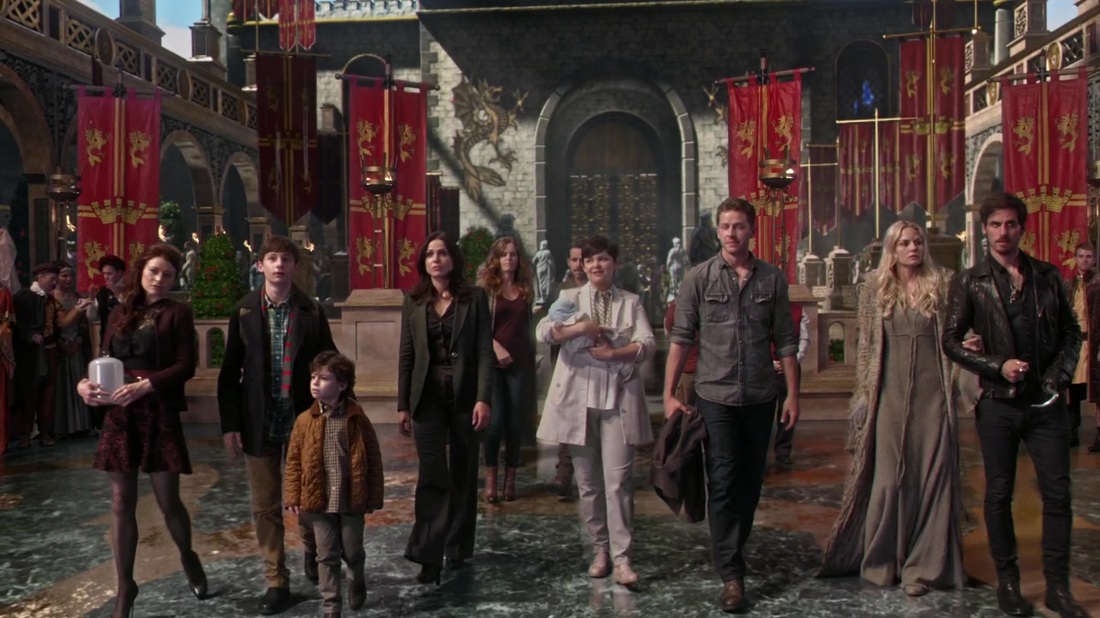|
1. Gold showed that he's willing to fight his cowardice for Belle. Do you think he will triumph over his demons and become the hero he's always wanted to be? Teresa: I'm not sure his demons will go away, but I believe he will be heroic. Both Belle and Bae have already inspired him to do some of the most heroic acts seen in the series. I think that Belle's life being on the line will once again bring out the best in him. As for the cowardice, Gold to me is not coming off as a coward, but rather displaying a natural reaction to being in a "Misery"- like situation. Moreover, his apparent bat-s&%^ crazy kidnappers keep taunting him--a cripple-- to fight. It's like "Mean Girls" on crack! I'd be freaking too. Hence I need more information about any "cowardice" the characters say he needs to overcome. But will he fight for Belle? Oh heck yes! Lori: I think it's within him to be heroic in the moment of dire need. I believe (and hope) that the Rumple who let go of his son's hand over a portal has evolved. But conquering his demons and making heroic choices with deliberate thought is harder. Amy: Perhaps. I think he can do just about anything for Belle, but I don't see him staying completely without magic forever. Francesca: I do think he will triumph because his love for Belle is strong and we saw his emotions when Merida showed him the chipped cup. But I still do not think he will be the hero in the end to help Emma with removing Excalibur from the stone.
0 Comments
1. The Dark Swan ordered Merida to train Gold in the art of bravery. Do you think she will succeed? Zach: I think a person can find their bravery in the right circumstances, but I don't think you can "train" someone to be brave. I do hope that Gold finds his courage because it would be a major development for his character, and I want to see him become a hero on his own. Joanne: It will be interesting to see the bravest of the Brave train the most cowardly coward. I hope she does succeed in giving Gold some backbone. I do think he has one buried under all his insecurities. Now that he doesn't have magic, he needs to find his inner strength. Ashley: I think the Dark Swan has some ulterior motives. The idea of being "brave" is very abstract. I wonder if she is using Merida as a way of coaxing something else out of Rumple. It can't be as simple as learning sword play. Perhaps it's a test to see what he will do when Merida pushes him to the limit..
1. Charming and Arthur went out on a quest and bonded. Then we learned of Arthur's treachery. How do you see this playing out? What has made Arthur so obsessed with saving Camelot? Teresa: I really enjoyed these scenes. Charming was finally featured! I don't think that Arthur is quite the villain he seems. At some point, yet to be revealed, he maybe was a "desperate soul" who started down a less honorable path in which he he didn't quite expect to find himself. I can see this leading to an ephipany and a subsequent heroic act which will free Merlin.. Mauri: I think Charming will catch on eventually. I'm glad Lancelot showed up. I think Arthur has gone mad. I'm also wondering if the people of Camelot are already dead like in the movie The Sixth Sense, and the magic in Storybrooke is keeping up their illusion. Francesca: I think Lancelot has a role to play in all this, and we have not yet seen all the clues to reveal Arthur's true purpose for saving Camelot, and Guinevere seems just has devious. I did like the scenes between Arthur and David on their quest for the Crimson Crown. Lori: One section of dialogue said it all for me. Arthur defines the nature of a quest as a search for something, and it is the search, not the finding, that is important. This is a major theme of medieval romance (and I don't mean romance in the modern sense of genre - medieval romance was literature focusing on chivalric deeds and quests, maybe with some courtly unrequited love thrown in to spice things up). And then Arthur throws this ideal on its head by stating if the finding is important for his kingdom then that is what matters to him. In true OUAT fashion, Arthur is not the ideal philosopher-king of Sir Thomas Malory's story, but a "real" person, much like the other fairy tale characters, made up of both heroic and villainous traits. (By the way, treachery was the utmost sin of the Middle Ages - Dante saved his final circle of Hell for traitors - so Arthur is treading on perilous ground here. No pun intended.) I simply cannot see Arthur as a full-on villain yet, no matter what Lancelot says. The Celtic idea of kingship was a sovereignty of the land: the king was tied to the land, literally and symbolically, and was expected to make sacrifices and decisions for the good of his kingdom. You can see this symbiotic relationship in the Wasteland of the Grail legends; the king of the land is maimed (usually in the thigh or groin), and thus the land itself is parched and barren. Arthur may be following this sovereignty, but to what extreme . . . in a real, flawed person, attempting to hold to this kingship ideal may lead to an "end justifies the means" mentality and single-mindedness. I think we saw this already in Arthur convincing his page to drink poison for the good of Camelot. To me, so far it is an interesting exploration of King Arthur as a flawed human leader rather than a literary ideal Amy: I think Arthur has been manipulated, and that he truly believes he is saving his kingdom and all he loves. He seems like such a smarmy jerk at the end of the episode, but I still feel like Shady Guinevere has something to do with all this. The Charmings are clever though, and I see them catching on pretty quickly to Arthur's shenanigans.
1. Emma refuses to reveal what drove her to darkness in Camelot. What do you think her motivations are? Zach: I feel like Emma's resistance to becoming the Savior is a major factor here. She refused to believe in magic (or Henry) in Season One, going so far as to tell August that she didn't want her destiny. She's struggled with who she is ever since, a struggle which was highlighted in season 3A's episode "Lost Girl," and even more during her confrontations with Ingrid in season 4A. My first thought when she yelled at Regina ("You want people to believe you're the Savior? Then step up and do what needs to be done!") was that she was really yelling at herself. Regina and Emma have always been mirrors for each other, and I think in that moment Emma saw her struggle reflected in Regina, and got angry because she let herself and her family down. I think that, when it came down to it, Emma had a choice whether to destroy the Darkness or not, and she made the wrong choice. She's ashamed and blaming her family for her own choices (rather like Regina), and her shame is what led her to erase their memories. Ashley: I'm not sure and I think that's the mystery I like the most about this season. I prefer that the writers spend more time in the missing six weeks than they did in the missing year of Season 3b. I want this mystery to unfold slowly, so for now I really can't guess since we don't have enough info. It must have been a serious betrayal though. Sam: I have two early theories on this. First, I wonder if even Emma does not remember what happened in Camelot. My second theory is that she cannot tell everyone what happened and she needs them to figure it out for themselves to be able to help her. Joanne: I don't think Emma can tell people why she embraced the dark side. She told Hook as much at her house. I think that she has been compelled to keep quiet about it by Merlin or even Arthur. Laurie: She said that Henry didn’t let her down, but it appears that literally everyone else did. I think it has to do with finding Merlin, and what may have happened when they found him. For some reason, he was unable or unwilling to rid Emma of the darkness - it may be that the others went behind Emma’s back and inadvertently prevented Merlin from helping her. Or he was killed or somehow rendered unable to help her? It seems like a personal disappointment on Emma’s part - that it is one more thing her parents (and others?) did where they thought they were helping her, but in reality they made things worse.
|




 RSS Feed
RSS Feed
